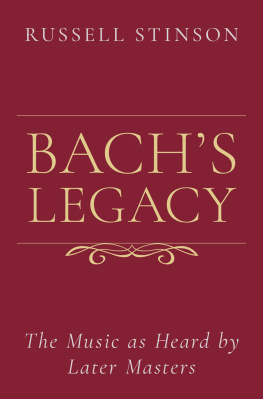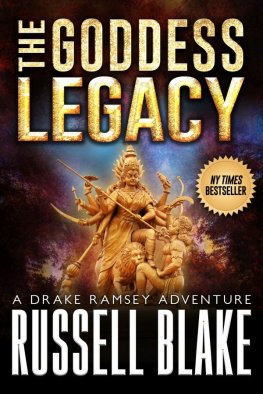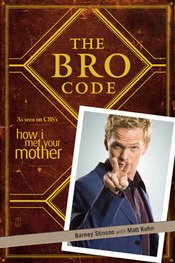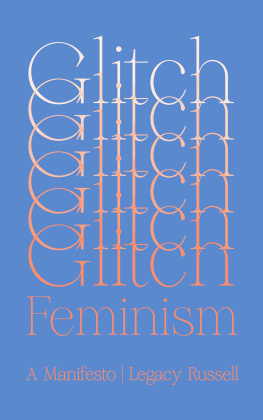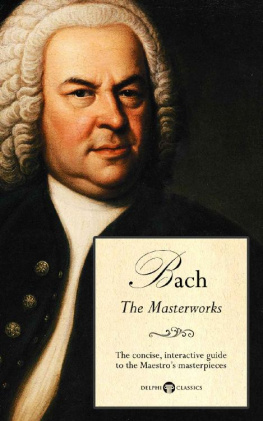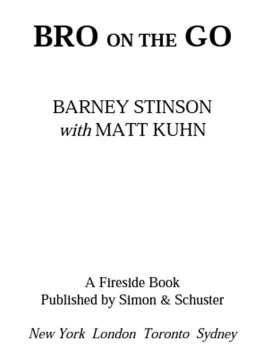Stinson Russell - Bachs Legacy
Here you can read online Stinson Russell - Bachs Legacy full text of the book (entire story) in english for free. Download pdf and epub, get meaning, cover and reviews about this ebook. year: 2020, publisher: OxfordUP, genre: Detective and thriller. Description of the work, (preface) as well as reviews are available. Best literature library LitArk.com created for fans of good reading and offers a wide selection of genres:
Romance novel
Science fiction
Adventure
Detective
Science
History
Home and family
Prose
Art
Politics
Computer
Non-fiction
Religion
Business
Children
Humor
Choose a favorite category and find really read worthwhile books. Enjoy immersion in the world of imagination, feel the emotions of the characters or learn something new for yourself, make an fascinating discovery.
- Book:Bachs Legacy
- Author:
- Publisher:OxfordUP
- Genre:
- Year:2020
- Rating:3 / 5
- Favourites:Add to favourites
- Your mark:
- 60
- 1
- 2
- 3
- 4
- 5
Bachs Legacy: summary, description and annotation
We offer to read an annotation, description, summary or preface (depends on what the author of the book "Bachs Legacy" wrote himself). If you haven't found the necessary information about the book — write in the comments, we will try to find it.
Bachs Legacy — read online for free the complete book (whole text) full work
Below is the text of the book, divided by pages. System saving the place of the last page read, allows you to conveniently read the book "Bachs Legacy" online for free, without having to search again every time where you left off. Put a bookmark, and you can go to the page where you finished reading at any time.
Font size:
Interval:
Bookmark:


Oxford University Press is a department of the University of Oxford. It furthers the Universitys objective of excellence in research, scholarship, and education by publishing worldwide. Oxford is a registered trade mark of Oxford University Press in the UK and certain other countries.
Published in the United States of America by Oxford University Press
198 Madison Avenue, New York, NY 10016, United States of America.
Oxford University Press 2020
All rights reserved. No part of this publication may be reproduced, stored in a retrieval system, or transmitted, in any form or by any means, without the prior permission in writing of Oxford University Press, or as expressly permitted by law, by license, or under terms agreed with the appropriate reproduction rights organization. Inquiries concerning reproduction outside the scope of the above should be sent to the Rights Department, Oxford University Press, at the address above.
You must not circulate this work in any other form and you must impose this same condition on any acquirer.
Library of Congress Cataloging-in-Publication Data
Names: Stinson, Russell, author.
Title: Bachs legacy : the music as heard by later masters /
by Russell Stinson.
Description: New York : Oxford University Press, 2020. |
Includes bibliographical references and index.
Identifiers: LCCN 2019049157 (print) | LCCN 2019049158 (ebook) |
ISBN 9780190091224 (hardback) | ISBN 9780190091248 (epub) |
ISBN 9780190091255 (online)
Subjects: LCSH: Bach, Johann Sebastian, 16851750AppreciationHistory. |
Mendelssohn-Bartholdy, Felix, 18091847. | Schumann, Robert, 18101856. |
Wagner, Richard, 18131883. | Elgar, Edward, 18571934. |
MusicHistory and criticism.
Classification: LCC ML410.B13 S88 2020 (print) | LCC ML410.B13 (ebook) |
DDC 780.92dc23
LC record available at https://lccn.loc.gov/2019049157
LC ebook record available at https://lccn.loc.gov/2019049158
To Emma, Henry, and Luke
| Bach-Dokumente VI | Ausgewhlte Dokumente zum Nachwirken Johann Sebastian Bachs 18011850, ed. Andreas Glckner et al. Kassel: Brenreiter, 2007. |
| BWV | Bach-Werke-Verzeichnis = Wolfgang Schmieder, Thematisch-systematisches Verzeichnis der musikalischen Werke von Johann Sebastian Bach. Revised edition. Wiesbaden: Breitkopf & Hrtel, 1990. |
| NBA | Neue Bach-Ausgabe = Johann Sebastian Bach: Neue Ausgabe smtlicher Werke. Kassel: Brenreiter; Leipzig: Deutscher Verlag fr Musik, 19542007. |
This book deals with the afterlife of Bachs music, which is to say the composers posthumous role in music history. As such, it represents the discipline of reception history, a field within art and literature that focuses less on the work itself than on the response of the reader, listener, or viewer. In the domain of musicology, reception historians normally trace the influence of one composer on a later one, or they engage with reviews, editions, transcriptions, concert programs, or performance styles. The historical layers imparted by this re-contextualization add immeasurably to the musics significance.
Reception historians have chosen Johann Sebastian Bach as a subject more often than any other composer, and for obvious reasons. The rediscovery of Bachs music in the early nineteenth century, after all, marked the first time that a great master, after a period of neglect, was granted his rightful place by a later generation. Given Bachs vast influence on posterity, there is no shortage of material, and there is every reason to believe that the field of Bach reception will continue to grow over the course of the twenty-first century. The two most important catalysts thus far in this process have been the sixth volume of the Bach-Dokumente series (Ausgewhlte Dokumente zum Nachwirken Johann Sebastian Bachs 18011850), an 815-page compilation of materials from the first half of the nineteenth century, published in 2007; and Bach und die Nachwelt, a four-volume series of essays, published between 1997 and 2005 and spanning almost two thousand pages, that covers the reception of Bachs oeuvre from 1750, the year of the composers death, to the year 2000. Both have been invaluable resources for my own research.
In the present monograph, I consider how four of the most prominent composers of the nineteenth and twentieth centuriesFelix Mendelssohn, Robert Schumann, Richard Wagner, and Edward Elgarengaged with Bachs legacy. At the heart of the matter, of course, is how these titans incorporated elements of Bachs style into their own masterworks. But rather than pursue this fairly obvious line of inquiry, I have chosen instead to investigate how these individuals responded to Bachs art in ways other than compositional, whether as performers, conductors, editors, scholars, critics, lecturers, or all-around ambassadors. How did these now-canonical composers help define Bachs oeuvre for their audiences and beyond? What exactly did these later masters hear in the music of their great predecessor?
In each of the following four chapters, which are given in roughly chronological order, I combine the disciplines of history, biography, and musical analysis in an attempt to answer these and other questions. I begin with Felix Mendelssohn Bartholdy, the figure most often associated with the so-called Bach revival, with an eye to Mendelssohns encounter with Bachs organ works. Having written extensively on this topic in the past, I explore here the abundant new information on the subject found in Felix Mendelssohn Bartholdy: Smtliche Briefe, a just-finished twelve-volume set of Mendelssohns letters that, as the first complete text-critical edition of these documents ever attempted, is bound to open up a host of fresh perspectives on the composers life and output. To judge from his letters, Mendelssohn received Bachs organ works in a variety of musical and social contexts across Europe, for he was just as prone to play them on the piano at a salon gathering in Dsseldorf or Paris as he was to render them on a pipe organ in Berlin, Dresden, Leipzig, London, or Wittenberg. We behold him enthusing over the transcendent beauty of the music, struggling with its uncompromising pedal parts, arranging private recitals of it, and turning it into a parlor game of sorts. I give particular emphasis to an all-but-lost collection of Bach piano transcriptions by Mendelssohns friend Johann Nepomuk Schelble (VI VARIERTE CHORLE fr die Orgel von J. S. BACH fr das Pianoforte zu vier Hnden eingerichtet), whose contents Mendelssohn shared with both his friends and his family.
The next chapter is devoted to Robert Schumann and his circle. It represents both a conflation and a revision of a pair of articles I recently Like his good friend Mendelssohn, Schumann had a particular affinity for Bachs organ works, and the subject matter of the first part of this chapter is a virtually unknown anthology of fourteen organ chorales by Bach compiled by Schumann for his colleague Eduard Krger. Though employed for most of his career as a schoolmaster in remote Ostfriesland, Krger was a formidable critic in addition to being a fine organist. He thanked Schumann for his efforts by sending him brief commentaries on the individual piecesmost of which were still unpublishedjust as he did some years later in a letter to the hymnologist Carl von Winterfeld, in hopes of piquing Winterfelds interest in the music. Krgers commentaries improve our understanding of the compositional style and historical performance practice of these works specifically as well as the reception of Bachs organ chorales in the nineteenth century generally.
Font size:
Interval:
Bookmark:
Similar books «Bachs Legacy»
Look at similar books to Bachs Legacy. We have selected literature similar in name and meaning in the hope of providing readers with more options to find new, interesting, not yet read works.
Discussion, reviews of the book Bachs Legacy and just readers' own opinions. Leave your comments, write what you think about the work, its meaning or the main characters. Specify what exactly you liked and what you didn't like, and why you think so.

